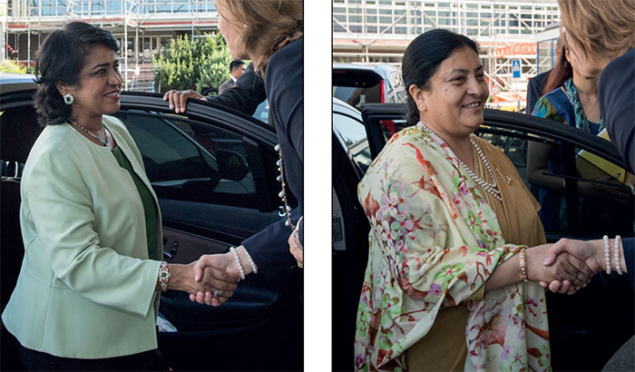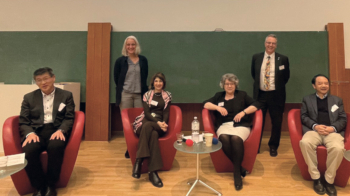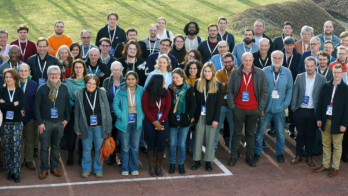A report from the first CERN South Asian High Energy Physics Instrumentation workshop held in June in Nepal.

Image credits: R Adhikari.
Particle physics is evolving as a result of greater co-ordination and collaboration on a global scale. This goes hand in hand with CERN’s policy of increased networking with organisations and institutions worldwide. In 2010, the CERN Council approved a radical shift in CERN’s membership policy that opened full membership to non-European states, irrespective of their geographical location. At the same time, the Council introduced the status of associate membership to facilitate the accession of new members, including emerging countries outside of Europe, which might not command sufficient resources to sustain full membership (CERN Courier December 2014 p58). Interest in membership and associate membership of CERN continues to grow (CERN Courier January/February 2017 p5).
CERN’s geographical enlargement policy offers clear opportunities to reinforce the long-term aspirations of the high-energy physics community. Enlargement is not an aim in itself. Rather, the focus is on strengthening relations with countries that can bring scientific and technological expertise to CERN and, in return, allow countries with developing particle-physics communities to build capacity. Presently, CERN has 22 Member States, seven associate Member States, and six states and organisations with observer status. From the South Asia region, Pakistan and India have recently become associate members. International Co-operation Agreements (ICAs) have been signed with Bangladesh, Nepal and Sri Lanka.
The first CERN South Asian High Energy Physics Instrumentation (SAHEPI) workshop on detector technology and applications, held on 20–21 June at Nepal’s Kathmandu University, Dhulikhel, brought together physicists and policy makers from the South Asia region and Mauritius. Representatives from Afghanistan, Bangladesh, Bhutan, India, the Maldives, Mauritius, Nepal, Pakistan and Sri Lanka were invited to attend. At least one senior scientist and one student from each country participated, making a total of about 70 participants, more than half of whom were students (representatives from the Maldives and Bhutan were not able to attend due to other commitments).

Image credits: R Adhikari.
The aim of the workshop was to bring together representatives from CERN and South Asia countries to strengthen the scientific co-operation between the Organization and the South Asia region. The workshop also provided the opportunity for countries to establish new contacts within the region, with the objective of initiating new intra-regional co-operation in high-energy physics and related technologies. The workshop was initiated as part of CERN’s broader efforts to establish relations with regions, complementing relations with individual countries, and follows similar regional approaches in Latin America and South-east Asia.
Rewards of participation
Progress in particle physics relies on close collaboration between physicists, technicians, hardware and software engineers and industry, and both Member States and associate Member States enjoy opportunities to apply for staff and fellowship positions and bid for CERN contracts. Collaborating with CERN also trains young scientists and engineers in cutting-edge projects, giving them expertise that can be brought to their home nations, and offers great opportunities for educating the next generation through CERN’s teacher programmes and others. Participation in CERN programmes has already fostered successful scientific collaborations in South Asia, where researchers have participated in many of CERN’s pioneering activities and made a significant contribution to the construction of the LHC. Indeed, CERN’s relations with South Asia feature strong partnerships dating back decades, particularly with India and Pakistan.
In 1994, CERN and the government of Pakistan signed an ICA concerning the development of scientific and technical co-operation in CERN’s research. This agreement was followed by the signing of several protocols, and today Pakistan contributes to the ALICE and CMS experiments as well as to accelerator projects such as CLIC/CTF3 and Linac 4, making Pakistan a significant partner for CERN. Pakistan has also built various mechanical components for ATLAS and for the LHC, and made an important contribution to the LHC consolidation programme in 2013–2014. In July 2015 Pakistan became an associate Member State of CERN.

Image credits: R Adhikari.
Given its long tradition and broad spectrum of co-operation with CERN since the 1970s, combined with the country’s substantial scientific and technological potential, India applied for associate membership in 2015. In particular, in 1996 the Indian Atomic Energy Commission (AEC) agreed to take part in the construction of the LHC, and to contribute to the CMS and ALICE experiments and to the LHC Computing Grid with Tier-2 centres in Mumbai and Kolkata. In recognition of its contribution to the construction of the LHC, India was awarded observer status in 2002. The success of the partnership between CERN and the Indian Department of Atomic Energy (DAE) regarding the LHC has also led to co-operation on novel accelerator technologies through DAE’s participation in CERN’s Linac 4, Superconducting Proton Linac (SPL) and CTF3 projects, and CERN’s contribution to DAE’s programmes. India is also participating in the COMPASS, ISOLDE and n_TOF experiments. India became an associate Member State in January 2017.
Broader region
In the recent past, contacts have also been established with several other countries in the South Asia region. Collaboration between Sri Lanka and CERN has been ongoing for a number of years, following an expression of interest signed between the CMS collaboration and the University of Ruhuna in 2006. This saw the first CERN summer students from Sri Lanka and the first PhD student graduating in 2013. The conclusion of the ICA with the government of Sri Lanka in 2017, and the expected entry of a consortium of universities from Sri Lanka into the CMS collaboration, are important steps for growing the country’s national high-energy physics capacity. Sri Lanka is moving towards membership of the CMS collaboration with an interest in contributing to the experiment’s upgrade programme, driven initially by the University of Colombo and the University of Ruhuna.
Official contacts between CERN and Bangladesh were established in 2012 with the signing of an expression of interest. This provided an interim framework to enable scientists, engineers and students from universities and research institutes of Bangladesh to further develop their professional training, in particular through participation in CERN’s scientific and training programmes. In 2014 CERN and Bangladesh signed an ICA, and the first Bangladesh–CERN school on particle physics was held at the University of Dhaka that year. Bangladesh is currently participating in the ALICE experiment as an associate member and working on physics analysis. There is a high potential for future development of the collaboration with CERN, through 39 public universities and 93 recognised universities and the high number of multidisciplinary research facilities of the Bangladesh Atomic Energy Commission.

Image credits: J Ordan/CERN.
Nepal has seven universities: Tribhuvan University (the largest and, until around 1990, the only university in the country); Kathmandu University; Pokhara University; Purbanchal University; Mahendra Sanskrit University; Far-western University; and the Agriculture and Forestry University. Tribhuvan and Kathmandu universities are considered to be best placed to develop scientific and technical co-operation with CERN, and collaborative activities are already under way between CERN and Nepal. Students from Nepal have been participating in the CERN summer-student programme for non-Member State nationals, and teachers from Nepal have taken part in the CERN high-school teachers programme. Several workshops on particle physics and related areas have been held at Tribhuven University and Kathmandu University, and an ICA between Nepal and CERN has recently been concluded.
Contacts with the physics communities of Afghanistan, Bhutan, the Maldives and Mauritius were established through the June workshop and will be pursued to explore ways and means to develop capacity in physics and related areas in these countries. The department of physics at the University of Kabul was established in 1942 and includes programmes for undergraduate and graduate studies in physics as well as student laboratories. The department of physics at the University of Mauritius includes research programmes in radioastronomy and applied radio frequency and it also operates the Mauritius Radio Telescope, while its undergraduate teaching programme includes courses in nuclear and elementary particle physics.
Moving forward
The nature of the national programmes in high-energy physics and related areas in these South Asian countries was the focus of discussions at the Kathmandu workshop. The aim was to identify synergies to establish stronger scientific collaboration across the region, such as promoting the exchange of researchers and students within the region. These efforts will help to build capacity, particularly in the countries with emerging high-energy physics programmes that face challenges in research infrastructure and university curricula.
The motivation and enthusiasm of the participants was palpable, and it was clear to see the efforts they put in for research and education. The proceedings of the workshop together with the identified strengths, weaknesses, opportunities and threats of the national programmes in high-energy physics and possibilities to strengthen the intra-regional co-operation will be presented to representatives of the governments from the participating countries with the objective to raise awareness at the highest political level.
CERN will continue to engage with the region in an effort to build capacity in high-energy physics research and education and to facilitate collaboration with CERN. It was decided that due to the success of this workshop, discussions will continue in Sri Lanka in 2019.





